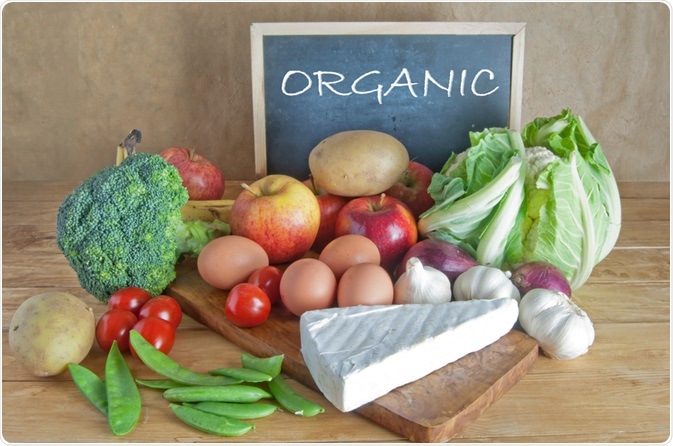Even though conventional food products are cheaper, organic food items such as fruits, vegetables, grains, and meats have gained popularity among consumers for many reasons.

Organic Food. Image Credit: Pixelbliss/Shutterstock.com
The main reason why organic food is preferred to conventional food is the belief that organic food contains higher nutritional benefits than non-organic food. Other common reasons to buy organic produce is to support the local market and also protect the environment.
The farming methods involved in organic production differ from non-organic or conventional farming. The most common practices in organic farming are as follows:
- No use of synthetic fertilizers.
- Minimal use of synthetic pesticides and herbicides.
- Genetically engineered crops or genetically modified organisms (GMOs) are not cultivated.
- Methods such as irradiation are not used to kill pests and pathogens or to extend shelf life.
- Growth hormones or antibiotics are not used to raise livestock.
- Processed organic foods do not contain any synthetic additives.
Health Benefits of Organic Food
Nutrients
Scientists have reported that crops grown in organic farms have higher levels of bioactive compounds and antioxidants than crops grown by conventional methods. This is because plants adopt natural defense systems to protect themselves against diseases, for example, the synthesis of antioxidants. Such useful bioactive compounds are not adequately produced when excessive chemical pesticides are used for crop development.
Scientists have also reported a higher concentration of bioactive compounds such as polyphenols, phenolic acids, and flavanones, in organic produce than its conventional counterpart. Some polyphenols have antioxidant properties that help protect cells from damage caused by free radicals.
Phenolic acids also have anti-cancer and anti-inflammatory properties. Polyphenols are found in beans, nuts, vegetables, spices, etc. Several recent studies have also revealed that organic food contains higher amounts of minerals and vitamins, such as zinc, vitamin C, and iron.
Beef and milk from organic farms have been reported to contain a higher concentration of omega-3-fatty-acids. These are healthy fats that help prevent coronary heart diseases. Scientists have reported that a higher level of beneficial omega-3 fatty acids is present in milk from grass-fed cows. Fish like salmon and mackerel are considered a rich source of omega-3-fatty-acids.
However, it must be noted that researchers have not found any significant difference in the nutritional levels (baring a few as mentioned previously) in the agricultural products obtained by both the types of farming (conventional and organic).
Food safety
As conventional farming uses synthetic pesticides and fertilizers for agricultural production, some amount of pesticide residues adheres to them, even after washing with water. On the contrary, organic foods contain minimal to lesser than detectable levels of pesticide residues. In other words, organic foods contain much lower levels of contaminants.
Epidemiological Studies Indicating the Benefits of Organic Foods
One of the most prominent benefits of an organic diet is minimal exposure to synthetic pesticides. Pesticides are extremely harmful to humans because of their carcinogenic, neurotoxic, and endocrine-disrupting properties.
Researchers have found that exposure to pesticides during pregnancy would negatively affect the child in terms of their intelligence quotient and neuro-behavioral development such as the development of attention deficit hyperactivity disorder (ADHD).
On evaluating the structural brain growth using magnetic resonance imaging, scientists have found that the gray matter was thinner in children whose mothers have greater exposure to organophosphates, a constituent of most pesticides. Thereby, an organic food diet is highly beneficial for pregnant and breastfeeding women.
Growth hormones or antibiotics used for raising livestock cause hormonal imbalances and drug resistance. Overuse of antibiotics in farm animals contributes to the development of antibiotic resistance against bacteria. The resistance may be passed on from animal to human beings, which has significantly raised concern for public health. As stated earlier, organic farming does not use antibiotics, therefore, they are considered a safer food option.
Researchers have also indicated that consumption of organic food may reduce the risk of allergic disease, and obesity. This may be because consumers of organic food tend to have overall healthier lifestyles.
In 2016, experts have prepared a report (European Parliament) that outlines the health benefits of organic food and the advantages of practicing an organic agricultural system. This report was based on various scientific evidence regarding the impact of organic food on human health.
The report included the outcome of major animal and in vitro studies, analysis of agricultural produce grown in different systems (conventional and organic), and epidemiological studies. The report includes the concerns raised by the experts about the presence of pesticides in food products produced by the conventional system.
However, authorities in both the United States and the European Union insisted that the current limits on the allowable amount of pesticides in conventional farming are safe.
Conclusion
This article reveals that organic food products are not only environmentally friendly but also safer than their non-organic counterparts. Even though the existing academic literature lacks strong evidence to substantiate the claim that organic food is significantly more nutritious, consumption of organic food will reduce exposure to harmful pesticide residues, growth hormones, etc. This will in turn benefit our overall health and well-being.
References and Further Reading:
Further Reading